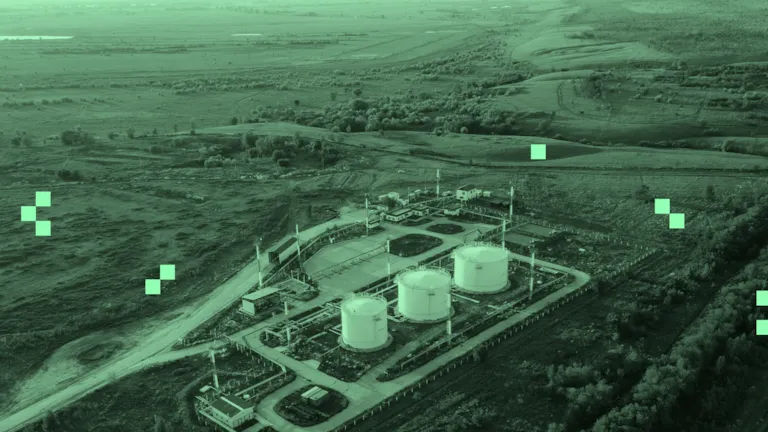|
Transcript:
|
Transcript:
TONY ALFANO Hey Koheila, what would you say to those people who don't believe that oil and gas have a space in the energy transition? |
Transcript:
KOHEILA MOLAZEMI That's an interesting question, Tony, I've been thinking about it myself. I would remind them about the strong history that oil and gas have in this field, in operating major hazard facilities, and the knowledge and experience they gained, the innovation experience developing breakthrough technologies, but also, all the safety experience we have gained operating these facilities. |
Transcript:
TONY ALFANO Hi, my name is Tony Alfano. I'm the Product Line Director for the Pipeline product line. I've been working with pipeline operators over my entire career, so I understand some of the challenges they're going through. Given all the push for renewables, oil and gas seems to take a backseat in the process, but it's key to know that they will remain fundamental inputs to our energy future. |
Transcript:
KOHEILA MOLAZEMI My name is Koheila Molazemi and I'm the Product Line Director for the Plant product line. I've been working most of my career in safety. The energy transition presents safety challenges and I'm hoping that we can use the expertise we have to help the industry with a safe and reliable energy transition and decarbonized operations. --- There are several transitions happening in the Energy Industry. The oil and gas and energy industry at large is going through an energy transition. We’ve seen a number of major oil and gas players even rebrand themselves as ‘energy’ companies to reflect the diversified nature of the future energy economy. Oil and Gas face several challenges going through these changes. Having said that I strongly believe that oil and gas companies are at the centre of energy transition and play a significant role in the whole energy transition. Of course, digital transformation is another transition our industry and many other industries are going through started years ago which presents several opportunities. These transitions are happening fast and at the same time. These transitions are taking customers out of their comfort zone. At the same time, energy demand increases. The world will continue to require energy to enhance standards of living and power the economy, so oil and gas companies will have an important role in delivering the decarbonized energy systems of the future and be part of the solution. So, with all these changes, where do we see the oil and gas industry going? |
Transcript:
TONY ALFANO Yes, you are right. There is a lot going on in the oil and gas space right now. There are all sorts of energy outlooks available, and everybody has got their opinions. But in general, we are starting to see two major patterns: For oil, crude, particularly, we're going to see a downturn over the next 50 year window as we see more electrification and more electric vehicles on the road that means less gasoline and less oil needed to produce that gasoline. So that's just a fact. In the natural gas space, what we're seeing is this ’Golden Age of Gas,’ as they call it, is coming to an end. So, where we've seen over the last decade, just massive, phenomenal growth year over year, now it plateaus. It's not that it's going away, we're going to continue to see the need for natural gas. But the fact that the oil goes down and natural gas stays, that's just an undeniable fact that they're going to see moving forward. On top of the transition and products that we're going to see, we're also seeing an undeniable force that is politics. We're seeing governments from around the globe try to drive decarbonization through new regulations and sponsored research and stimulus while at the same time increasing the criticality of energy security and supply. |
Transcript:
KOHEILA MOLAZEMI So, what do these changes mean for the oil and gas operators? |
Transcript:
TONY ALFANO We’re seeing enablers like The IRA in the US play a major part. This has changed the prioritization of decarbonization for an entire country. We're seeing big pushes, an influx of capital to help drive the investment in renewables and decarbonization in general, which, to a pipeline and gas operator, means injecting hydrogen and trying to find a way to lower their own footprint. Given this shift and political pressures, it is becoming more difficult to build new oil and gas assets across the globe. Whether you're a pipeline operator or an oil and gas operator, in general, it's much more difficult than it ever has been to build new. So, the big challenges that are coming out of this are life extension, pushing some of these assets well beyond their design life, and repurposing. Given the fact that repurposing an asset is drastically cheaper than buying new, we're seeing a lot of interest in the repurposing of these assets. |
Transcript:
KOHEILA MOLAZEMI Another challenge we also see is the shortage of skills that are needed for the future, whether it is digital transformation or the energy transition. We hear this from the customers and industry as a whole and is highlighted in many industry reports including DNV’s Energy Industry report. So Tony, you mentioned life extension is one area of focus within existing oil and gas customers. However, extending the life of a 25-30-year-old asset for another five, ten, fifteen years presents several technical challenges. How are operators addressing these challenges? |
Transcript:
TONY ALFANO The DNV Energy Industry Insights 2023 report found that 75% of the oil and gas operators surveyed stated that in the year ahead, their organization will prioritize improving data quality and availability. We know that data is the enabler of all things. And in this case, to be able to do life extension right, the data that's sitting behind there is really critical to get those calculations correct. So that's definitely the starting point. We're also seeing a common theme. We're seeing these oil and gas operators, or these energy operators, as you say, looking to evaluate their assets on a common playing field. If they've got a pipeline asset, maybe it's high-pressure/ low-pressure, and maybe they've got some facilities in the mix. They want to be able to evaluate all of them with a common risk framework to allow them to truly know that they're putting their limited operating budget to the best use. So, they're turning to tools to help them do that evaluation, as well as trying to help them evaluate what happens if I extend this pipeline or facility out a little bit further. Or what happens if I change the maintenance procedure and extend or shorten those time periods? We're seeing a lot of this experimentation, and it's really critical that the data is right behind those calculations. |
Transcript:
KOHEILA MOLAZEMI Digitalization, of course, plays a very important role here and better use of data. But also, what we see here is the conversion. Many companies and industries are repurposing their facilities to introduce hydrogen and CO2. Hydrogen and CCS, or CCUS, however we call it, are an undeniable part of the energy transition for the future. We are in discussions with a lot of operators who are running feasibility studies for repurposing their distribution systems and pipelines to introduce hydrogen or CO2 into the energy mix and repurpose their facilities. Of course, these new chemicals present new risks and technical challenges that need to be addressed thoroughly and properly. If I take Hydrogen as an example, Hydrogen has significantly different physical and chemical properties to natural gas, and it presents different types of safety challenges that need to be understood. A lot of customers who are thinking about repurposing or planning to repurpose their facilities are running safety studies, and risk studies to understand what additional risks are introduced by adding hydrogen or CO2 into the mix and, whether these risks are still within acceptable levels or not. And if not, then what additional control measures do they need to have in place, whether it's hardware, safety barriers or procedural changes, to operate these facilities more safely? So that's another area that we see, as you mentioned, in terms of the conversion and repurposing. So similarly for introducing CO2 or repurposing pipelines for CO2, for example, the companies who have more experience in oil or natural gas need to understand what it takes and what are the risks and also the operating procedures connected to the supercritical CO2 systems as such.
|
Transcript:
TONY ALFANO Absolutely! From the pipeline space, particularly for the distribution operators, one of the key challenges for them that's coming out of this is this new future. This blending often results in different inputs going into one system, so the timeliness of their data is really coming into play. To operate a system like that safely and get the energy requirements to their customers, these operators are looking to figure out how they can build accurate and up-to-date models that they can use to make all these decisions a lot faster. So, this is just compiling to the digital challenge that's going on right now as part of this transition. |
Transcript:
KOHEILA MOLAZEMI Very interesting Tony. It is a challenging but also exciting time for our industry. The oil and Gas industry is at the centre of the energy transition and plays a significant role in this. Over many decades, oil and gas companies have gained significant knowledge and experience in a major hazard industry, which can be leveraged to accelerate a safe and reliable energy transition. And let’s not forget the role of innovation and breakthrough technologies. Many parts of the energy value chain, from the operators to manufacturers, suppliers, engineering and consulting companies, are investing in digitalization and innovation projects in many areas supporting these transitions. We all have to play our part to make this happen, hopefully with the pace needed. It certainly sounds like a lot of work to meet these challenges. But it is also very exciting to work with the industry to make it happen. |
Transcript:
TONY ALFANO Absolutely! Looking forward to it. |






